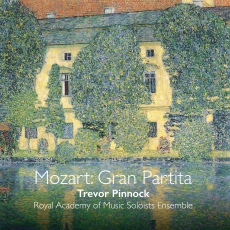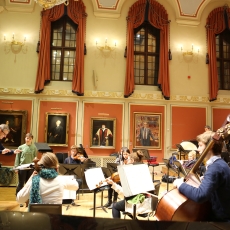Royal Academy of Music Soloists Ensemble & Trevor Pinnock - Mozart: Gran Partita - The Arts Desk
Mozart's Gran Partita is a multi-movement work longer than many romantic symphonies, hardly what we'd expect from a serenade. It's miraculous stuff, of course, a sublime blend of earthy charm and sensuality. The best performances know when to keep their feet securely on the ground, and this one is among them. Many readings employ a double bassist, but Trevor Pinnock uses a contrabassoon, arguing that Mozart would have preferred one had 18th-century contrabassonists been up to the job.
This is a student ensemble, but you'd never guess; the sound has a delicious weight and richness. The instrumental colours are nicely blended but well delineated - basset horns audibly distinct from clarinets, the oboes' intonation immaculate. The opening seconds of the fifth movement "Romance" demonstrate exactly how these players get it right: a euphonious bath of wind sound, warm enough to set one's spine tingling. Pinnock keeps the great "Adagio" flowing, the offbeat accompaniment perfectly balanced before the oboe entry. Mozart's last movement bounces along, the closing chords feeling as if they've arrived too soon. You're compelled to listen to the whole thing again.
There's a generous bonus in the form of Haydn's Notturno No.8 in G. The original scoring included a pair of lire organizzate. These hybrid instruments, a cross between an organ and a hurdy gurdy, proved impossible to find during one of Haydn's trips to London, so the lire and a pair of clarinets were replaced with flute, oboe and two violins. What may have sounded appealingly shady becomes bright, breezy and not very notturno-like at all, though Haydn's central "Adagio" has a symphonic weight. A 6/8 hunting finale provides a rousing close. Effortless playing - a really enjoyable disc.


